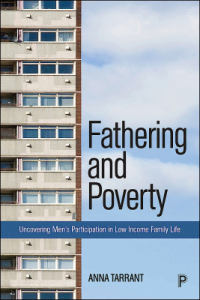Today is the UN Day for the International Eradication of Poverty and the need to tackle poverty and its gendered impacts, including on families, has never been more important.
It may seem unusual to bring questions of fathering into contemporary discussions about poverty, as it is well established that women experience relatively higher rates of poverty than men and are at more risk of remaining in poverty across the life course. When fathers feature in discussions of family poverty, they are also typically considered absent (emotionally and financially), and the main cause of the poverty of their children.
Yet, today more than ever, fathers are spending more time with their children and the shift towards more engaged models of fatherhood that acknowledge men’s capacities for caregiving has been recognised as a core component of societal efforts to address gender equality for women and for men. Seeking ways to support men in increasing their opportunities and investments as fathers, including in low-income families, is a worthy goal and one that aligns with at least three of the UN Sustainable Development Goals: progress towards ending poverty, reducing inequalities and achieving gender equality.
Yet progress in this regard is frequently stymied by a presumed ‘crisis of fatherlessness’ and misplaced assumptions about fathers and male caregivers in low-income families. One of the dominant, yet problematic, policy explanations for deepening inequalities and poverty is that there is a culture of poverty in certain families, a culture that is transmitted across generations. This explanation allocates blame to individuals and families for their own poverty and assumes a failure that must be addressed by behavioural intervention.
The recent policy preoccupation with fathers, and indeed mothers residing in low-income localities, is one such manifestation of this thinking. Low-income fathers are frequently framed negatively, as ‘feckless’, as ‘failures’, and as problems to be solved rather than assets to their families and communities. When David Cameron developed explanations about why the urban riots occurred in 2011, he first blamed lone mothers who did not discipline their children, and then absent fathers who were shirking their responsibilities as effective male role models in the lives of boys and young men. In doing so, his comments deflected attention away from wider socioeconomic and historical processes and absolved the state of responsibility for addressing the structural determinants of poverty and disadvantage that had long preceded the crisis.
These discourses notably tend to resurface at times of crisis, including the socioeconomic and public health crises of the last decade, which have continued to erode the living standards, resources and dignity of low-income families and communities. When we trace the ‘crisis of fatherlessness’ historically and over time, we can observe that the way in which fathers (and mothers) in low-income families are stigmatised today is actually part of a much broader historical process in which working-class men and fathers have been portrayed in deficit terms and as if somehow separate or divorced from their home and family contexts with limited contributions to make.
Against this background of rapid change and transformation, negative discourses of men in low-income families as failing fathers are often inadvertently supported by a lack of research with men in low-income families, which obscures their experiences and connections to family. With reference to the work of Mincy et al., caution must be urged about how the stigmatising labels of feckless and irresponsible men operate to deflect attention from questions about men and how their welfare might be better supported to flourish for their benefit and that of their children, partners and coparents. Instead, we might more usefully frame the question: how are societies failing their fathers?
To ask this question is to consider how and to what extent current welfare, support and policy systems are either enabling or failing to address the needs and welfare of families and the individuals that comprise them. In my ongoing research, my team and I are working collaboratively with young fathers and UK charities who champion father-inclusive support, to promote a new policy and practice agenda for young fathers and their families that is premised on an ethos of compassion, care and dignity. Together we are supporting young fathers to campaign, on behalf of themselves and other fathers, for multiagency professionals to help them combat the deficit narratives that accumulate around low-income and marginalised fathers. Through our work we are addressing the need to shape a welfare environment and policy agenda that provides alternative mechanisms for them to fulfil their expressed ambitions to be engaged fathers and citizens.
While by no means a sticking plaster for decades of austerity and crisis that has eroded living standards and deepened hardship, this work is exploring the value of creating opportunities for young disadvantaged young fathers to navigate the adversities they face, to address the inequalities they experience and to advocate change among service professionals and policy makers. Far from failing fathers, these young men are committed to their children and their futures but are being failed by a complex mix of precarity in labour markets, dwindling social support and increasingly punitive and conditional welfare systems that sustain their impoverishment.
Anna Tarrant is Professor at the University of Lincoln and a UKRI Future Leaders Fellow.

Fathering and Poverty by Anna Tarrant is available on the Bristol University Press website. Order here for £24.99.
Chapter 2 is available for free until 31st October here.
Use the code EPOV50 to get a 50% discount until 31st October.
Bristol University Press/Policy Press newsletter subscribers receive a 25% discount – sign up here.
Follow Transforming Society so we can let you know when new articles publish.
The views and opinions expressed on this blog site are solely those of the original blog post authors and other contributors. These views and opinions do not necessarily represent those of the Policy Press and/or any/all contributors to this site.
Image credit: Saavedraperales on Unsplash


